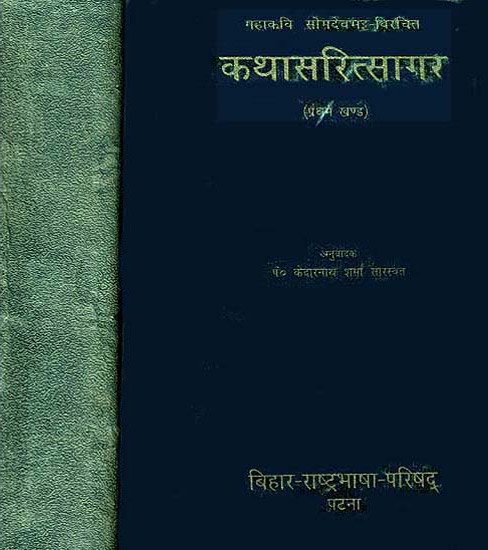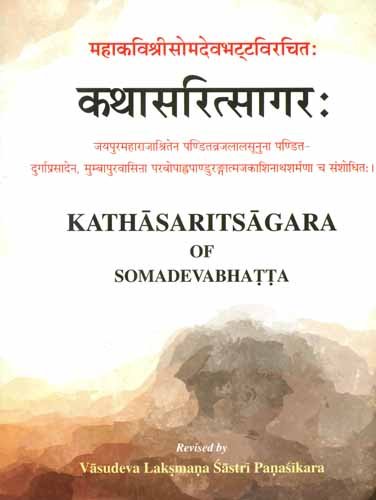Kathasaritsagara [sanskrit]
by C. H. Tawney | 2014 | 226,424 words | ISBN-13: 9789350501351
The Sanskrit edition of the Kathasaritsagara referencing the English translation and grammatical analysis. Written by Somadeva and dating from the 12th century, the Kathasaritsagara (or Katha-sarit-sagara) represents an epic legend narrating the adventures of Naravahanadatta as he strives to become the destined emperor of the Vidyadharas. Alternative titles: (Kathāsaritsāgara, कथासरित्सागर, Kathā-sarit-sāgara)
Verse 6.8.253
भक्तानुकम्पिनि जयाद्रिसुते त्वयाद्य रत्यास् तपः स्वयमुपेत्य कृतं कृतार्थम् ।
इत्य् आदि दिव्यवरचारणवाद्यमिश्र वाक्यानुमेयम् अपि संदधते ऽत्र गौर्याः ॥ २५३ ॥
bhaktānukampini jayādrisute tvayādya ratyās tapaḥ svayamupetya kṛtaṃ kṛtārtham |
ity ādi divyavaracāraṇavādyamiśra vākyānumeyam api saṃdadhate 'tra gauryāḥ || 253 ||
The English translation of Kathasaritsagara Verse 6.8.253 is contained in the book The Ocean of Story by C.H. Tawney. This book is available online or you could buy the latest edition:
Read online Buy now! The English translation by C.H. Tawney (2014)
Glossary of Sanskrit terms
Note: This extracts Sanskrit terms and links to English definitions from the glossary, based on an experimental segmentation of verse (6.8.253). Some terms could be superfluous while some might not be mentioned. Click on the word to show English definitions.
Bhaktanukampini, Jaya, Sut, Suta, Suti, Tva, Yushmad, Adya, Rati, Tap, Tapa, Tapas, Svayam, Upetya, Krit, Krita, Kritartha, Adi, Adin, Div, Divi, Divya, Avara, Carana, Vadi, Vadin, Vadya, Amishra, Vakya, Uma, Iyam, Idam, Api, Sat, Atra, Gauri,
Analysis of Sanskrit grammar
Note: this is an experimental feature and only shows the first possible analysis of the Sanskrit text (Kathasaritsagara Verse 6.8.253). If the system was successful in segmenting the sentence, you will see of which words it is made up of, generally consisting of Nouns, Pronouns, Verbs, Participles and Indeclinables. Click on the link to show all possible derivations of the word.
- Line 1: “bhaktānukampini jayādrisute tvayādya ratyās tapaḥ svayamupetya kṛtaṃ kṛtārtham ”
- bhaktānukampini -
-
bhaktānukampini (noun, masculine)[compound], [adverb]bhaktānukampini (noun, feminine)[compound], [adverb]bhaktānukampini (noun, neuter)[compound], [adverb], [nominative single], [vocative single], [accusative single]
- jayād -
-
jaya (noun, masculine)[adverb], [ablative single]jaya (noun, neuter)[adverb], [ablative single]
- ri -
-
rī (noun, feminine)[adverb]rai (noun, masculine)[adverb]
- sute -
-
sut (noun, masculine)[dative single]sut (noun, neuter)[dative single]suta (noun, masculine)[locative single]suta (noun, neuter)[nominative dual], [vocative dual], [accusative dual], [locative single]sutā (noun, feminine)[nominative dual], [vocative single], [vocative dual], [accusative dual]suti (noun, feminine)[vocative single]√su -> suta (participle, masculine)[locative single from √su class 5 verb]√su -> suta (participle, neuter)[nominative dual from √su class 5 verb], [vocative dual from √su class 5 verb], [accusative dual from √su class 5 verb], [locative single from √su class 5 verb]√su -> sutā (participle, feminine)[nominative dual from √su class 5 verb], [vocative single from √su class 5 verb], [vocative dual from √su class 5 verb], [accusative dual from √su class 5 verb]√sū -> suta (participle, masculine)[locative single from √sū class 6 verb]√sū -> suta (participle, neuter)[nominative dual from √sū class 6 verb], [vocative dual from √sū class 6 verb], [accusative dual from √sū class 6 verb], [locative single from √sū class 6 verb]√sū -> sutā (participle, feminine)[nominative dual from √sū class 6 verb], [vocative single from √sū class 6 verb], [vocative dual from √sū class 6 verb], [accusative dual from √sū class 6 verb]√sū -> suta (participle, masculine)[locative single from √sū class 2 verb]√sū -> suta (participle, neuter)[nominative dual from √sū class 2 verb], [vocative dual from √sū class 2 verb], [accusative dual from √sū class 2 verb], [locative single from √sū class 2 verb]√sū -> sutā (participle, feminine)[nominative dual from √sū class 2 verb], [vocative single from √sū class 2 verb], [vocative dual from √sū class 2 verb], [accusative dual from √sū class 2 verb]√su (verb class 2)[present middle third single]
- tvayā -
-
tvā (noun, feminine)[instrumental single]yuṣmad (pronoun, none)[instrumental single]
- adya -
-
adya (indeclinable adverb)[indeclinable adverb]adya (noun, masculine)[compound], [vocative single]adya (noun, neuter)[compound], [vocative single]
- ratyās -
-
rati (noun, feminine)[ablative single], [genitive single]ratī (noun, feminine)[ablative single], [genitive single]
- tapaḥ -
-
tapas (noun, neuter)[compound], [nominative single], [vocative single], [accusative single]tap (noun, masculine)[nominative plural], [vocative plural], [accusative plural], [ablative single], [genitive single]tap (noun, neuter)[ablative single], [genitive single]tapa (noun, masculine)[nominative single]
- svayam -
-
svayam (indeclinable)[indeclinable]
- upetya -
-
upetya (noun, masculine)[compound], [vocative single]upetya (noun, neuter)[compound], [vocative single]
- kṛtam -
-
kṛta (noun, masculine)[adverb], [accusative single]kṛta (noun, neuter)[adverb], [nominative single], [accusative single]kṛtā (noun, feminine)[adverb]kṛt (noun, masculine)[accusative single]√kṛ -> kṛta (participle, masculine)[accusative single from √kṛ class 1 verb], [accusative single from √kṛ class 2 verb], [accusative single from √kṛ class 5 verb], [accusative single from √kṛ class 8 verb]√kṛ -> kṛta (participle, neuter)[nominative single from √kṛ class 1 verb], [accusative single from √kṛ class 1 verb], [nominative single from √kṛ class 2 verb], [accusative single from √kṛ class 2 verb], [nominative single from √kṛ class 5 verb], [accusative single from √kṛ class 5 verb], [nominative single from √kṛ class 8 verb], [accusative single from √kṛ class 8 verb]√kṛ (verb class 2)[imperative active second dual]
- kṛtārtham -
-
kṛtārtha (noun, masculine)[adverb], [accusative single]kṛtārtha (noun, neuter)[adverb], [nominative single], [accusative single]kṛtārthā (noun, feminine)[adverb]
- Line 2: “ity ādi divyavaracāraṇavādyamiśra vākyānumeyam api saṃdadhate 'tra gauryāḥ ”
- Cannot analyse ity*ād
- ādi -
-
ādi (noun, masculine)[compound], [adverb]ādi (noun, neuter)[compound], [adverb], [nominative single], [vocative single], [accusative single]ādi (noun, feminine)[compound], [adverb]ādin (noun, masculine)[compound], [adverb]ādin (noun, neuter)[compound], [adverb], [nominative single], [vocative single], [accusative single]
- divya -
-
divi (noun, masculine)[compound], [adverb], [nominative dual], [vocative dual], [accusative dual]divī (noun, feminine)[compound], [adverb], [nominative single], [vocative single]divya (noun, masculine)[compound], [vocative single]divya (noun, neuter)[compound], [vocative single]√div -> divya (absolutive)[absolutive from √div]div (noun, masculine)[locative single]
- avara -
-
avara (noun, neuter)[compound], [vocative single]avara (noun, masculine)[vocative single]
- cāraṇa -
-
cāraṇa (noun, masculine)[compound], [vocative single]cāraṇa (noun, neuter)[compound], [vocative single]
- vādya -
-
vādi (noun, masculine)[compound], [adverb], [nominative dual], [vocative dual], [accusative dual]vādi (noun, neuter)[compound], [adverb], [nominative single], [vocative single], [accusative single]vādi (noun, feminine)[compound], [adverb], [nominative dual], [vocative dual], [accusative dual]vādin (noun, masculine)[compound], [adverb], [nominative single]vādin (noun, neuter)[compound], [adverb], [nominative single], [vocative single], [accusative single]vādya (noun, masculine)[compound], [vocative single]vādya (noun, neuter)[compound], [vocative single]√vad -> vādya (participle, masculine)[compound from √vad]√vad -> vādya (participle, neuter)[compound from √vad]√vad -> vādya (absolutive)[absolutive from √vad]vādī (noun, masculine)[compound], [adverb], [vocative single]vādī (noun, feminine)[compound], [adverb], [nominative single], [vocative single]vādī (noun, neuter)[compound], [adverb], [nominative single], [vocative single], [accusative single]√vad -> vādya (participle, masculine)[vocative single from √vad class 1 verb], [vocative single from √vad]√vad -> vādya (participle, neuter)[vocative single from √vad class 1 verb], [vocative single from √vad]
- amiśra -
-
amiśra (noun, masculine)[compound], [vocative single]amiśra (noun, neuter)[compound], [vocative single]
- vākyān -
-
√vac -> vākya (participle, masculine)[accusative plural from √vac class 2 verb], [accusative plural from √vac class 3 verb]√vak -> vākya (participle, masculine)[accusative plural from √vak class 1 verb]
- ume -
-
uma (noun, masculine)[compound], [vocative single], [locative single]umā (noun, feminine)[nominative single], [nominative dual], [vocative single], [vocative dual], [accusative dual]√u (verb class 1)[perfect active first plural]√u (verb class 2)[perfect active first plural]√u (verb class 5)[perfect active first plural]
- iyam -
-
iyam (noun, feminine)[nominative single]ī (noun, feminine)[accusative single]ī (noun, masculine)[accusative single]idam (pronoun, feminine)[nominative single]
- api -
-
api (indeclinable preposition)[indeclinable preposition]ap (noun, neuter)[locative single]
- san -
-
sa (noun, neuter)[adverb]sat (noun, masculine)[nominative single], [vocative single]sam (Preverb)[Preverb]
- dadhate' -
-
√dadh (verb class 1)[present middle third single]√dhā (verb class 1)[present middle third single]√dhā (verb class 3)[present middle third plural]
- atra -
-
atra (indeclinable adverb)[indeclinable adverb]atra (noun, masculine)[compound], [vocative single]atra (noun, neuter)[compound], [vocative single]
- gauryāḥ -
-
gaurī (noun, feminine)[ablative single], [genitive single]
Other editions:
Also see the following editions of the Sanskrit text or (alternative) English translations of the Kathasaritsagara Verse 6.8.253
Kathasaritsagar
by Kedarnath Sharma Saraswat (2005)
The Only Edition with the Sanskrit Text and its Hindi Translation (An Old and Rare Book) Set of 3 Vol.
Buy now!
Kathasaritsagara of Somadeva Bhatta (Sanskrit Text Only)
by Vasudeva Laksmana Sastri (2013)
Katha Sarit Sagar in Marathi
by H. A Bhave (1995)
Set of 5 Volumes; Published by Varada Books, Pune. 2256 pages (Throughout B/W Illustrations).
Buy now!
Katha Sarit Sagara (Tamil)
by S. V. Ganapati (எஸ். வி. கணபதி) (2014)
[கதா சரித் சாகரம்] Published by Alliance Publications.
Buy now!
Galpa Shono
by Abhijit Chattopadhyay (2014)
[গল্প শোনো] Galpa Shono: Bengali Translation of 'Suno Kahani From Katha Sarit Sagar'; 9788126015436; Published by Sahitya Akademi, Delhi.
Buy now!Preview of verse 6.8.253 in Bengali sript:
ভক্তানুকম্পিনি জযাদ্রিসুতে ত্বযাদ্য রত্যাস্ তপঃ স্বযমুপেত্য কৃতং কৃতার্থম্ ।
ইত্য্ আদি দিব্যবরচারণবাদ্যমিশ্র বাক্যানুমেযম্ অপি সংদধতে ঽত্র গৌর্যাঃ ॥ ২৫৩ ॥
![Kathasaritsagara [sanskrit] - book cover](/uploads/a/Katha-Sarit-Sagara.jpg)




